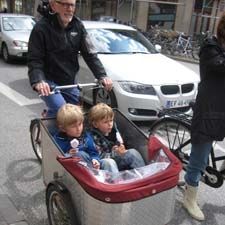COPENHAGEN, Denmark (BRAIN)—The Bikes Belong Foundation brought public officials from Los Angeles, Boston, Seattle and Kent, Washington, to five Danish cities last week during its European Study Tour, part of its Bicycling Design Best Practices Project.
The nine delegates learned about how a nation formerly plagued with transportation problems identical to those in the U.S. transformed itself into a headline-grabbing national model for bicycling.
Denmark’s reputation as a bike-friendly nation has been well documented. But, it wasn’t always that way. A very deliberate set of decisions starting in Denmark in the 1970s changed the way Danes confronted an oil crisis and resulted in turning residents there onto bikes for transportation. Today, bikes are as elemental to the Danish lifestyle as zippers are to clothes in terms of speed and practicality.
During the weeklong tour, delegates were engaged in presentations by the cities of Aarhus, Fredericia, Odense, Ballerup and Copenhagen about how each city planned for and accommodated bike use as part of its traffic design.
In addition, delegates were treated to presentations by Gehl Architects, the Danish State Railway, ATKINS, Veksoe, Aros Kommunikation, COWI Economics Institute, Mikael Colville-Andersen of Copenhagenize.com, and the Danish Cyclists' Federation.
Delegates from Los Angeles saw Copenhagen's big roads, high-end cars and three-lane highways as similar to their own urban landscape, which underscored LA’s huge potential to become a top bike city.
“They have been willing to make compromises about using that space and that’s where I think our next step is. It’s recognizing that cars are part of the landscape, but bikes can also ride in that same corridor by taking just a little of that space,” said Michelle Mowery, senior bicycle coordinator at the Los Angeles’ Department of Transportation.
Bikes Belong has guided similar tours in bike-friendly nations including the Netherlands and Spain.
(PHOTO: Twenty percent of Danish families with two or more children own cargo bikes).
—Wendy Booher


